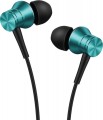Cable type
The type of cable provided in the design or delivery of the headphones. Note that this parameter is relevant both for wired or combined models (see “Connection type”), and for some wireless models - in particular, earbuds and in-ear headphones
without a mount, where a wire connects one earphone to another.
-
Round. The classic round wire is straight, without braiding or other additional accessories. It is inexpensive and in most cases quite practical, which is why it is found in most modern headphones. The disadvantage is that if the thickness is small, the round wire is prone to tangling; therefore, this option is considered not very convenient for compact headphones, such as in-ear or in-ear (see “Design”), which often have to be carried in a pocket or bag.
-
Flat. The main advantage of a flat cable is that it does not get tangled as much as a round cable, and if something happens it is much easier to untangle. This is especially important for earbuds and in-ear headphones, which are often rolled up for storage or transport. However, larger overhead models can also be equipped with a flat wire.
— Round,
braided. A round wire with an outer braid, usually fabric. See above for details on round wire. And the presence of a braid gives such a cable a number of advantages over the classic one with “bare” insula
...tion. Thus, the wire turns out to be more durable, reliable and resistant to kinks and pressure, tangles less, has a solid appearance, and in some models the braiding also provides shielding from external interference. The downside of these advantages is the increased price.
— Spiral. A round cable, coiled into a spring. The main advantages of a spiral wire are that it practically does not tangle and can significantly stretch relative to its original length. The latter is very convenient if, as you use your ears, you have to change the distance to the signal source. The disadvantages of spiral cable are bulkiness and relatively high cost. Therefore, it is often used in mid-range and top-end headphones (including professional models).
- Round, braided. A cable in the form of two wires twisted into a spiral. This option should not be confused with a spiral wire - in this case we are not talking about a spring. This cable is notable primarily for its unusual appearance; For greater originality, the wiring can be made in different colors. It is also somewhat more tangle-resistant than the classic round one, although a lot depends on the thickness. At the same time, individual wires can be noticeably thinner than a solid round wire, which somewhat reduces reliability.Sensitivity
Rated headphone sensitivity. Technically, this is the volume at which they sound when a certain standard signal from the amplifier is connected to them. Thus, sensitivity is one of the parameters that determine the overall volume of the headphones: the higher it is, the louder the sound will be with the same input signal level and other things being equal. However, we must not forget that the volume level also depends on the resistance (impedance, see above); moreover, it is worth choosing “ears” for a specific device first by impedance, and only then by sensitivity. In this case, one parameter can be compensated for by another: for example, a model with high resistance and high sensitivity can work even on a relatively weak amplifier.
As for specific figures, headphones with indicators of 100 dB or less are designed mainly for use in a quiet environment (in some similar models, the sensitivity
does not exceed 90 dB). For use on the street, in transport and other similar conditions, it is desirable to have more sensitive headphones — about
101 – 105 dB, or even
110 dB. And in some models, this figure can reach
116 – 120 dB. and even
more.
It is also worth noting that this parameter is relevant only for a wired connection according to the analogue standard — for example, via a 3.5 mm mini-
...jack. When using digital interfaces like USB and wireless channels like Bluetooth, the sound is processed in the built-in headphone converter, and if you plan to mainly use this kind of application, you can not pay much attention to sensitivity.Speaker size
The diameter of the speaker installed in the headphones; models with multiple drivers (see "Number of drivers"), usually, the size of the largest speaker is taken into account, other dimensions can be specified in the notes.
In general, this parameter is relevant primarily for over-ear headphones (see "Design"). In them, emitters can have different sizes; the larger it is, the more saturated the sound is and the better the speaker reproduces the bass, however, large emitters have a corresponding effect on the dimensions, weight and price of the headphones. But in-ear "ears" and earbuds, by definition, have very small speakers, and rich bass in them is achieved due to other design features.

